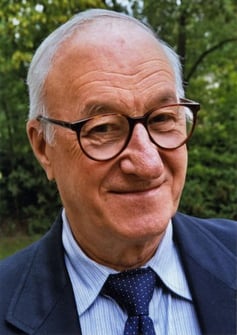Do you have influence on the direction your life? According to psychologist, Albert Bandura, you sure do.
Bandura has contributed to the study of psychology through his theory known as Human Agency. Put simply, Human Agency is the ability to have influence over the course of your life. That is, you are an active and influential agent over the decisions and direction of your life.
 Albert Bandura / CC BY-SA 4.0
Albert Bandura / CC BY-SA 4.0
In an interview by the Association for Psychological Science (APS) Bandura said,
“My theory is a reflection of my life path.”
Bandura grew up in Mundare, a remote town of 400 inhabitants in central Alberta, Canada. Bandura, however, did not allow his circumstances to determine his future. Instead, he was a prime example of someone who didn’t allow circumstances to determine the course of his life, but rather, rose above his circumstances and took an active role in the direction of his life.
Although a proper education required a far commute, Bandura still attended the University of British Columbia for his college education. Not stopping there, after graduating from the University of British Columbia, Bandura traveled to the United States where he completed his M.A. and Ph.D at the University of Iowa.
What It Means to Be an Agent
In an article on Human Agency from Stanford University it explains that to be an agent is to:
“Influence intentionally one’s functioning and life circumstances. In this view, personal influence is part of the causal structure. People are self-organizing, pro-active, self-regulating, and self-reflecting. They are not simply onlookers of their behavior. They are contributors to their life circumstances, not just products of them.”
It can be seen, then, that to be an agent is to have influence in the way you behave, in the way you organize your life, and in the activities you choose to partake in. Seen through this light, human agency can influence many areas of our lives, i.e., our careers, productivity, mental health, relationships, morality, to name a few.
Self-Efficacy: The Foundation of Human Agency
The foundation of human agency is self-efficacy, that is, the belief in one’s ability to successfully achieve change through action. In order for human agency to work we must believe in our ability to carry out the desired results from our goals and actions. Moreover, self-efficacy helps determine a person’s outcome when faced with difficulty. A person of high self-efficacy will surmount difficulties whereas a person of low self-efficacy will crash in the face of difficulty. To see a short-animated video clip on the basic concept of self-efficacy see below.
[embed]https://www.youtube.com/watch?v=HnACsrdGZAI&feature=youtu.be[/embed]
Human Agency and Self-Efficacy Can Help in Moral Conversion
In previous posts, there have been discussions on moral conversion and the role it plays in our spiritual life. Where spiritual conversion is more connected with our love for God, moral conversion looks to our actions—our ability to act in accord with God’s commandments.
Needless to say, this can be difficult for man who has been wounded by sin. As such, Bandura’s theory of human agency can be an extremely helpful tool in living a moral life as it can help us bring harmony between our “higher” and “lower” selves whereby achieving self-mastery and the ability to act in accord with virtue rather than vice.
To learn more about how psychology can help in moral conversion read sections II.B-II.B.4 of Fr. Spitzer’s Moral Conversion and Resisting Temptation.
Read Also:
Is It Possible to Change Your Reality?
Increasing Happiness Through the Exploration of Transcendence
